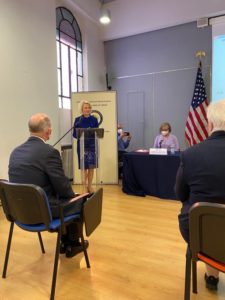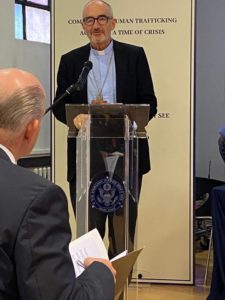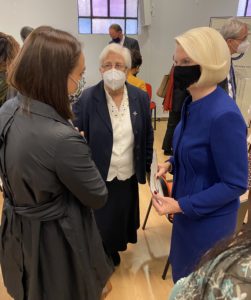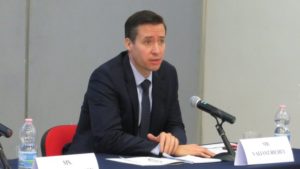COVID has only increased the risks of human trafficking and exploitation, and this vulnerability requires our urgent and concrete response.
This was at the heart of a virtual Symposium organized by U.S. Ambassador to the Holy See, Callista Gingrich, and her embassy in Rome, titled “Combatting Human Trafficking: Action in a Time of Crisis,” Oct. 14, 2020, during which the Ambassador decried trafficking as “a stain on all of humanity,” noting it invades borders, destroys communities, and robs millions of their human dignity.
ZENIT’s Senior Vatican Correspondent followed the event organized by the U.S. Embassy to the Holy See, via Zoom, in compliance with anti-COVID 19 rules and provisions.
“During the COVID-19 pandemic, human traffickers continue to prey upon the most vulnerable,” Ambassador Gingrich said, noting: “Unlike other industries, human trafficking is impervious to our current health crisis. In fact, in many communities, exploitation, abuse, and modern slavery are on the rise.”
Lamenting that countless victims, especially women and children, face growing threats, she warned that as the economic fallout of this pandemic continues, additional men, women, and children are likely to become victims of forced labor and sex trafficking.
Calling for tackling together this scourge, the U.S. Ambassador praised the work of Talitha Kum and explained the concrete actions of the United States Government, including more than 100 million dollars from the U.S. Justice Department, to work toward defeating the crisis.
She said that her Embassy is honored to promote and support “the courageous work of Catholic sisters,” noting U.S. grants have funded anti-trafficking programs for women religious internationally, who “are working tirelessly” against the scourge.
“We applaud the work of Talitha Kum — a global organization, led by Sister Gabriella Bottani and comprised of over 2,000 Catholic sisters in 92 countries – all working to eradicate human trafficking,” Ambassador Gingrich underscored.
 From the Vatican, Jesuit Cardinal Michael Czerny, Under-Secretary of the Migrants and Refugees Section, of the Dicastery for Promoting Integral Human Development, spoke. The M&R Section is responsible for issues related to human trafficking and helping victims.
From the Vatican, Jesuit Cardinal Michael Czerny, Under-Secretary of the Migrants and Refugees Section, of the Dicastery for Promoting Integral Human Development, spoke. The M&R Section is responsible for issues related to human trafficking and helping victims.
“The vast majority of people,” Cardinal Czerny lamented, “are not having their basic human needs met.” “That should mobilize us,” the close papal collaborator encouraged.
The Czech-born Canadian cardinal expressed his hope that we “might rediscover once for all that we need one another, and that in this way our human family can experience a rebirth, with all its faces, all its hands and all its voices, beyond the walls that we have erected.”
Cardinal Czerny highlighted how the Holy Father’s call to fraternity in his recent social encyclical Fratelli Tutti helps provide a compass to help individuals, institutions and governments, to work together, to effectuate change and have meaningful results.
The Ambassador to the Holy See and Sister Patricia Murray, Executive Secretary of the International Union of Superiors General (UISG), gave welcome remarks, which were followed by an address by John Cotton Richmond, U.S. Ambassador-at-Large to Monitor and Combat Trafficking in Persons.
Ambassador Gingrich expressed appreciation for the invaluable collaboration between the United States and Holy See and underscored the “moral imperative” of the United States to work against human trafficking.
 Ambassador John Cotton Richmond, also decried the severity of the crisis, but added: “There are many reasons for hope – and the efforts of religious communities provide tangible examples for our hope.”
Ambassador John Cotton Richmond, also decried the severity of the crisis, but added: “There are many reasons for hope – and the efforts of religious communities provide tangible examples for our hope.”
Various religious sisters also spoke and were praised for their extraordinary efforts to help human trafficking world wide. Sister Murray told a story of a young man from Ghana, Edward, whose family worked to raise money for him to travel to Europe and have a better life there, but was later enslaved and tortured.
Later a panel brought light to various issues tied to trafficking. Those speaking were Sister Gabriella Bottani, International Coordinator of Talitha Kum Network; Olga Zhyvytsya, International Advocacy Officer of Caritas Internationalis; Kevin Hyland, OBE Senior Advisor of Santa Marta Group; Princess Okokon, Cultural Mediator Piam ONLUS Asti; and Valiant Richey, Special Representative and Coordinator for Combatting, Trafficking in Human Beings OSCE.
Sr. Gabriella Bottani: in this time of crisis, @USIG and @talithakum reaffirm their commitment to the dignity of each person, particularly the trafficked person. pic.twitter.com/BsYEorF2zm
— U.S. in Holy See (@USinHolySee) October 14, 2020
Richey shared the disconcerting fact that for every 2300 trafficked victims, only one trafficker is prosecuted. “We have to stop buying goods made by trafficked persons,” he said, adding that in the 20 years since the adoption of the Palermo Protocol, not a single country has defeated human trafficking.
“COVID19,” he implored, “is a time to invest in combatting human trafficking. Failure to do so will turn a health crisis into a humanitarian crisis.”
Once can watch the video of the “Combatting Human Trafficking: Action in a Time of Crisis” symposium, to learn how the #COVID19 pandemic has heightened the risks of human trafficking worldwide, by clicking the following link: fb.watch/17XsJz77Eh/
This year of 2020 marks the 20th anniversary of two significant anti-trafficking agreements. The United States’ Trafficking Victims Protection Act, signed into law on Oct. 28, 2000, established the U.S. Department of State’s Office to Monitor and Combat Trafficking in Persons, the United States’ first office solely dedicated to combating all forms of human trafficking, and mandated an annual Trafficking in Persons Report, which has become a critical tool of U.S. diplomacy.
Second, the Palermo Protocol was adopted by the United Nations on Nov 15, 2000, serving as a multilateral tool to prevent, suppress, and punish human trafficking. To date, 178 countries have signed the Protocol, “making it one of the most widely adopted international accords in history.”
Here is the US-Embassy provided intervention of Ambassador Gingrich:
***
Opening Remarks
Ambassador Callista L. Gingrich
“Combatting Human Trafficking: Action in a Time of Crisis” Symposium
International Union of Superiors General (UISG)
Rome, Italy
October 14, 2020
Your Eminence, Your Excellencies, distinguished guests, and friends – good morning and welcome!
I’d to thank Sister Pat Murray and UISG for your support and collaboration today.
I would also like to thank Ambassador John Cotton Richmond for his participation by video.
Ambassador Richmond serves as the U.S. Ambassador at Large to Monitor and Combat Trafficking in Persons.
I would also like to thank our colleagues from the Holy See who are with us this morning. We are grateful to his His Eminence, Cardinal Michael Czerny, for offering closing remarks.
Finally, I would like to thank our moderator, Barbie Nadeau, and our distinguished group of panelists for their participation.
The scourge of human trafficking is a stain on all of humanity. It invades borders, destroys communities, and robs millions of their human dignity.
During the COVID-19 pandemic, human traffickers continue to prey upon the most vulnerable.
Unlike other industries, human trafficking is impervious to our current health crisis. In fact, in many communities, exploitation, abuse, and modern slavery are on the rise.
Countless victims, especially women and children, face growing threats.
As the economic fallout of this pandemic continues, additional men, women, and children are likely to become victims of forced labor and sex trafficking.
Confronted with this great challenge, we must increase our efforts in the fight against human trafficking.
President Trump and the United States Government are committed to protecting trafficking victims, prosecuting traffickers, and ending modern slavery.
On September 21 Attorney General William Barr announced that the U.S. Justice Department will provide more than $100 million dollars in grants to combat human trafficking.
This money will go to special task forces working to defeat traffickers, support research and evaluation, and to provide services and housing to victims.
Combatting the global evil of human trafficking is a top priority for our embassy, and a cornerstone of our relationship with the Holy See.
Governments, however, cannot act alone. Human trafficking is a global crisis and requires global solutions – across all sectors of society.
Indeed, faith-based organizations, are among some of our best partners in this endeavor, at home and abroad.
The U.S. Embassy to the Holy See is honored to promote and support the courageous work of Catholic sisters. Our grants have funded anti-trafficking programs for women religious around the world.
We applaud the work of Talitha Kum — a global organization, led by Sister Gabriella Bottani and comprised of over 2,000 Catholic sisters in 92 countries – all working to eradicate human trafficking.
Faith-based organizations like Talitha Kum labor tirelessly to save men, women, and children from horrific fates.
They are also key partners for law enforcement, braving the omnipresent threat of criminal and terrorist organizations that profit from this global crime.
Our symposium comes at a historic moment in the fight against human trafficking.
First, 2020 marks the 20th anniversary of the United States’ Trafficking Victims Protection Act.
This act, signed into law on October 28, 2000, established the U.S. Department of State’s Office to Monitor and Combat Trafficking in Persons – our country’s first office solely dedicated to combating all forms of human trafficking.
This act also mandates an annual Trafficking in Persons Report, which has become a critical tool of U.S. diplomacy.
2020 also marks the 20th anniversary of the Palermo Protocol, adopted by the United Nations on November 15, 2000, as a multilateral tool to prevent, suppress, and punish trafficking in persons.
Today, 178 countries are signatories to this Protocol, making it one of the most widely adopted international accords in history.
I look forward to our discussion and hope each of us will leave this symposium with renewed dedication and resolve to eradicate human trafficking.
Together we can save lives and end this horrific injustice.
Thank you.
[Intervention Texts Provided by US Embassy to the Holy See on Their Website]


